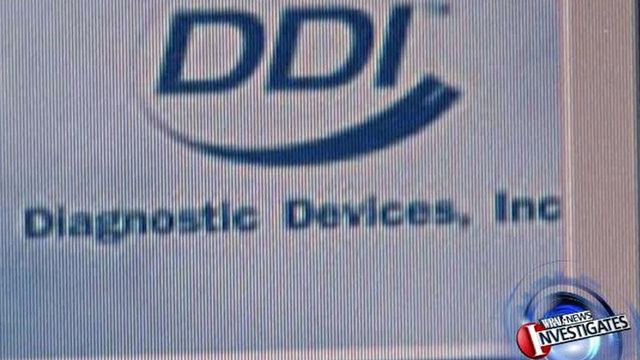NC medical supplies company facing new troubles
A North Carolina-based medical supplies company, which received a $30 million no-bid contract from the state, is facing new troubles.
Posted — UpdatedA bankruptcy attorney is suing the Charlotte company, Diagnostic Devices, and accusing the owners of shady business practices, which is the latest turn in an 18-month WRAL News investigation.
Diagnostic Devices provides all of the diabetes testing supplies to North Carolina Medicaid recipients. When the little-known company was awarded a no-bid contract with the state in late 2009, the state Department of Health and Human Services received a stack of dozens or protest letters expressing unhappiness.
“It's not a good product. I mean, it's worse than not a good product. It's faulty and it could be dangerous,” Kim Hanchette, past president of the Research Triangle Association of Diabetes Educators, said when comparing the Prodigy meter to other devices that test blood-sugar levels in diabetics.
Records from the Food and Drug Administration show one life-threatening incident with the Prodigy meter. In December, two Adverse Event Reports were filed after a child had a diabetic seizure.
One report, filed by the child’s parent, questions the Prodigy meter’s readings while the child was still at home and the role that played in the child suffering a seizure. That report also noted a major discrepancy in readings from the Prodigy meter as compared with the hospital’s meter.
The second report, filed by a nurse at the hospital, also notes the discrepancy in between the two readings.
“If you can't rely on it to be accurate, it just doesn't seem fair to the people living with diabetes who are on Medicaid in North Carolina,” Hanchette said.
Hanchette said she also has concerns about the background of the company and its owners, brothers Richard Admani and Ramzi Abulhaj. The brothers have been involved in an eight-year, bitter bankruptcy case in Florida involving their past company, VitalCare, which also sells diabetes products.
A new lawsuit has been filed by the trustee, naming Diagnostic Devices, which accuses Admani and Abulhaj of violating court orders, not paying off old debt, hiding money in other companies and stealing customer contacts, all to make the company profitable while neglecting the responsibilities of the bankruptcy agreement.
“I don't understand why the state would contract with an organization that has all these problems,” Hanchette said.
WRAL News tried for weeks to contact the media representative listed on the Prodigy website, but she recently left the company and the messages were not forwarded to the company’s corporate counsel, Andrew O’Hara.
After WRAL's story aired, a spokesman for Prodigy Diabetes Care sent an email to WRAL and said that Prodigy is a separate corporate entity from Diagnostic. According to Prodigy's website, the company is an affiliate of Diagnostic Devices.
It's unclear if Diagnostic lived up to promises to move manufacturing from China and Taiwan to North Carolina, creating hundred of jobs. Recent cargo records show the company received a large shipment of medical supplies from Asia, as recently as November.
The state Department of Health and Human Services, which awarded the contract to Diagnostic Devices, refused to comment on the latest lawsuit but told WRAL in late 2009, when the story was first reported, that the company's legal issues are not a problem.
“I've been assured that the references have been checked about the product and the availability of product and the quality of product, and everything is fine,” DHHS Secretary Lanier Cansler said in a December 2009 interview.
When asked if the department had done background checks on the people who own the company, Cansler said no.
“That is not something we would normally do. We're worried about now,” he said.
Patient advocates say due diligence was not done on the company or the product.
“This is the first time in 21 years that I've been in diabetes that one particular product is so bad and inaccurate,” Hanchette said.
The state's contract with Diagnostic Devices ends later this year. DHHS says the next contract will be decided by an open bidding process. The scope of that contract should be released in the next couple of weeks.
• Credits
Copyright 2024 by Capitol Broadcasting Company. All rights reserved. This material may not be published, broadcast, rewritten or redistributed.






